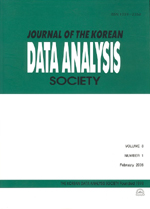외국인 통안증권 투자의 결정요인 분석
Foreign Investment in Monetary Stabilization Bond, Before and After the Financial Crisis
- 한국자료분석학회
- Journal of The Korean Data Analysis Society (JKDAS)
- Vol.13 No.3
-
2011.061547 - 1557 (11 pages)
- 33

본 연구는 최근 우리나라 국고채에 대한 외국인의 투자 동향과 결정요인을 살펴본다. 한국은행이 발행하는 통화안정증권(통안증권, Monetary Stabilization Bond)에 대한 외국인 매수 자료를 사용하여 외국인의 국채수요에 영향을 미치는 경제변수들의 효과를 추정한다. 외국인의 국내채권투자는 2007년 이후 꾸준히 증가해 왔으나 2008년의 금융위기기간에 급격히 감소하였다. 이자율 재정거래기회, 원달러환율, 이자율의 장단기구조 등 여러 경제변수들이 외국인 통안증권의 일일 순매수액에 미치는 영향을 추정한 결과, 이자율 재정거래기회가 2007년부터 2009년 사이의 외국인 통안증권 투자를 설명하는데 중요한 역할을 하였다. 하지만 리만브라더스의 파산이후에는 재정거래기회와 외국인 통안증권 투자 사이에 더 이상 통계적으로 유의한 상관관계가 나타나지 않았다. 리만브라더스의 파산 이후에는 외국인의 위험에 대한 태도를 반영하는 CDS(Credit Default Swap)프리미엄의 변화가 통안증권수요의 변화를 설명하는데 더욱 중요한 역할을 하였다.
This paper examines recent trends in foreign investment in Korean government debt and identifies factors that affect the short run change in foreign demand of Monetary Stabilization Bond (MSB) issued by the Bank of Korea. Although it has abruptly decreased during the global financial crisis, foreign investment in Korean government-issued bonds has steadily increased since 2007. Estimating the effect of the interest arbitrage opportunity, exchange rate, term structure of interests, and other economic variables on the daily change in the MSB demand by foreigners, this paper finds that interest rate arbitrage opportunity is important in understanding the foreign investment in MSB between 2007 and 2009. However, during the sample period after the bankruptcy of Lehman Brothers, the estimation result shows that arbitrage opportunity is not significantly correlated with foreign demand in MSB. Foreign investors’ attitude toward risk, measured by the CDS (Credit Default Swap) premium, seems to play a more important role in explaining the change in foreign investment in MSB during the crisis.
1. 서론
2. 외국인 채권투자의 추이와 결정요인
3. 외국인 통안증권 투자의 결정요인 추정
4. 결론
참고문헌
(0)
(0)